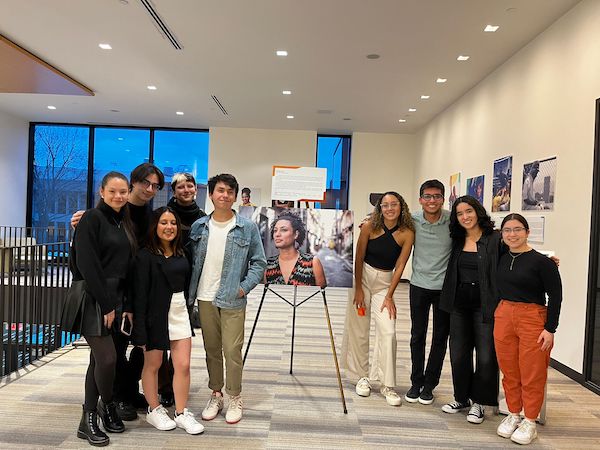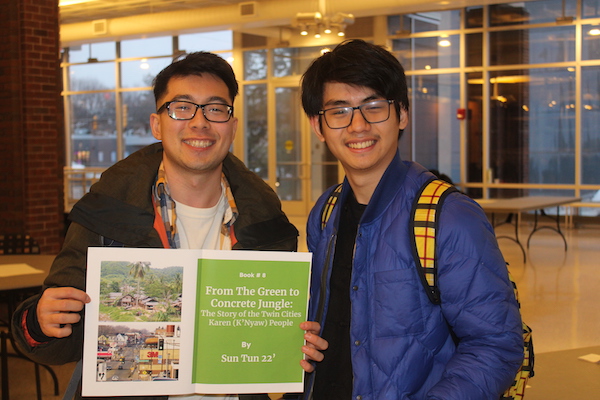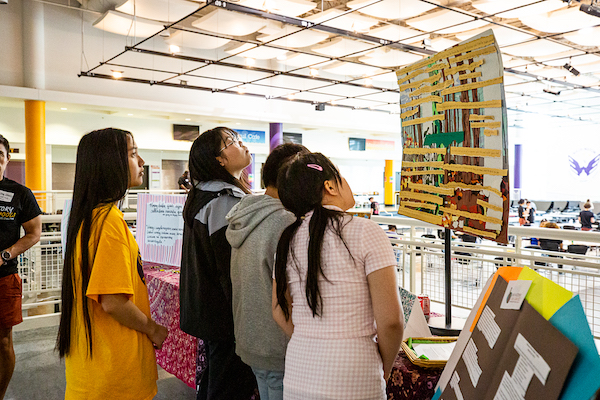
This year, Macalester students, faculty, and staff pitched a wide range of ideas focused on promoting racial justice, then developed them all the way through to fruition with support from the college’s Racial Justice Project Fund. On campus and beyond, their five projects—selected by a committee of students, faculty, and staff—uplifted community partners, fostered challenging conversations, celebrated lived experiences through storytelling, and inspired reflection and calls to action.
Created in 2020, the Racial Justice Project Fund consists of gifts designated by Macalester Fund donors. Last summer, the first funded project was an experiential learning program focused on the Civil Rights Movement, hosted by the Department of Multicultural Life (now the Lealtad-Suzuki Center for Racial Justice). Three more projects will receive funding for implementation this fall, followed by the next cycle of projects. The goal: to expand the college’s racial justice work, and empower community members by providing a pathway to take action on their ideas.
We asked three of this year’s project leaders to tell us about their experiences.
Centering Afro-Latinx stories
Amanda Nogueira Moreira de Souza ’25 grew up in Rio de Janeiro, Brazil, in the country with the largest population of Black people outside of Africa. In the United States, though, she noticed right away that Black Latinx people aren’t represented prominently at colleges and universities, including Macalester. For the Racial Justice Project Fund proposal she developed as part of the student group Adelante, she wanted to change that. “We wanted to create spaces to center Black Latinx stories,” de Souza says. “It’s meaningful for our campus to see those people and stories, and we’re also doing this for ourselves and our own knowledge.”
One piece of the group’s plan fell into place quickly. Adelante members had been trading Instagram messages with the New York-based theater troupe Black Latina Movement, but didn’t have the budget to bring them to campus. “But the universe was working in our favor,” she says. “Right after that, we became aware of the Racial Justice Project Fund. From the beginning, we knew that this performance needed to be part of our proposal.”
Turning their plans into reality required a total team effort. In addition to learning skills to coordinate and host a theater performance, Adelante members also worked over spring break to prepare for the “Afro-Latinx Radical Love” photo exhibition, highlighting the stories of famous Afro-Latinx people around the world.
Two days after the exhibit opening, Adelante hosted Black Latina Movement on campus for a performance of Black Latina, The Play, followed by a Q&A with the actors. “The play was about anger and hope, and it was powerful for me as an individual and also for our community,” de Souza says. “It was a busy time of year, with people studying for exams and also fasting for Ramadan, but during and after the Q&A, people just stayed—they didn’t want to leave. It was beautiful to see the Mac community be in those spaces and see this as a priority.”
For de Souza, the Racial Justice Project Fund support encouraged her to put ideas and goals into practice. “It helps raise awareness of these important topics, and helps us grow individually and together in identifying and understanding racism,” she says. “We’re doing something—we’re not just dreaming.”

Honoring the power of narratives
When Rola Cao ’25 (Nanjing, China) submitted her Racial Justice Project Fund proposal last December, she didn’t know the exact format that would take shape. But she knew it would happen in collaboration with community partners, and she knew the overarching theme for any program she would build: narrative matters. “Lots of public narratives about Asian Americans are written or used by other people—the agency of shaping narratives isn’t always held by Asian American communities,” says Cao. “There’s a saying, ‘If you don’t use your voice, someone else will.’ It’s very important to reclaim our own voices.”
Once she secured funding, she found that the grant support helped open doors for conversations with community partners, who recognized a shared mission and commitment to working toward racial justice. Ultimately, Cao coordinated three programs for Macalester’s AAPI Month: hosting the Asian American Organizing Project for a workshop about police and community safety in the United States; centering southeast Asian communities through exploration of memory mapping, facilitated by the Southeast Asian Diaspora Project; and a “human library” that fosters one-on-one conversations to honor the power of storytelling and reclaiming narratives of Asian American faculty, staff, alumni, and students.
The Human Library, in Cao’s words, aims to challenge monolithic stereotypes of Asian and Asian American communities by “inviting community guest speakers—called ‘books’—to share their stories through conversations with participants—called “readers,” she says. “It’s a powerful format to talk about racial justice. You sit with someone whose path you might never normally cross and hear their story, and their insights come with so much vulnerability because they’re sharing their journeys with a bunch of strangers. Vulnerability isn’t a solution to the problem, but each storyteller is imagining what triumph looks like in racial justice. That’s a call to action, and it requires a lot of trust.”
All three programs, Cao says, encouraged attendees to engage in conversations that were at times difficult and very personal—and to reflect about their own experiences. “It’s not only hearing other peoples’ voices,” she says. “It’s also about reclaiming your own voice, and thinking about your own story and how it connects to the bigger story. What solutions and future do we prioritize?”

Above: At the Human Library event in April, Sun Tun ’22 and Khant Wai Yan ’25—who each connect a piece of their home and history to Myanmar (Burma)—met for the first time and reflected on that country’s ongoing dictatorship and humanitarian crisis.
Supporting ethnic studies in schools
Last year, St. Paul Public Schools (SPPS) enacted a critical ethnic studies mandate for all sophomores in the school district, a requirement that emerged through activism from SPPS students. Throughout the past year, Professor Brian Lozenski and Professor Gonzalo Guzmán—both part of the Educational Studies Department—have visited SPPS classes and provided professional development for teachers through their roles on the district’s advisory board for critical ethnic studies. Part of their work also included making plans with the district’s ethnic studies coordinators Xue Xiong and Mouakong Vue for a showcase event at the end of the school year—supported by the Racial Justice Project Fund—as a public education opportunity about ethnic studies.
That’s where Mac students Louise Yang ’24 and Andrew Lee ’23 came in. “We wanted this showcase to be student-led and student-centered,” Lozenski says. “We knew that the high school students would need mentorship and support, and we knew Mac students could provide that—and would learn from the process, too. The learning experience is not restricted to within the walls of our campus. It can happen in these communities that are transforming what education looks like, and it can be just as important as what happens in class.”
In addition to working with SPPS students throughout the spring, Yang and Lee—educational studies and American studies majors, respectively—also participated on the planning committee for a public daylong showcase event in June, which included capstone presentations, community-led workshops, and keynote speakers and guest artists. This year’s program coincided with a national Teach the Truth day of action, to highlight the importance of teaching ethnic studies at a moment when the subject is being criticized and restricted in schools across the country.
The Racial Justice Project Fund support paid for stipends for the high school and college students on the advisory committee. “Financial resources can be a barrier for students who want to do this kind of work, and we’re able to signal that their time is valuable and we want to support them,” Lozenski says. “Absent this funding, I’m not sure what this event would look like. It has been a game-changer.
“We often talk about racial justice and equity, and that can get caught up in rhetoric,” he says. “This fund names that this work requires not just talking but also investment—and this investment helps create tangible outcomes.”

Photo credit: Xue Xiong
July 12 2023
Back to top




